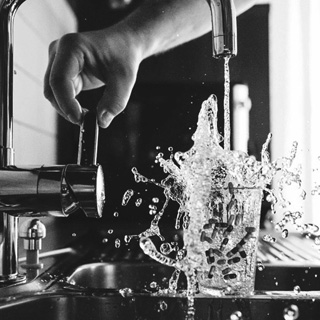
Pharmaceutical residues in drinking water and water bodies
- Project team:
Bernd Klauer (Project Manager, UFZ) Christoph Aicher, Tanja Bratan, Ulrike Eberle, Thomas Hillenbrand, Klaus Kümmerer, Wolfgang Reuter, Johannes Schiller, Nona Schulte-Römer, Engelbert Schramm, Felix Tettenborn, Carolin Völker, Anna Walz
- Thematic area:
- Topic initiative:
Committee on Education, Research and Technology Assessment
- Analytical approach:
TA project
- Startdate:
2014
- Enddate:
2018
sprungmarken_marker_1903
Subject and objective of the project
Medicines serve to protect the health of humans and animals. Due to the ageing population and enhanced health protection, their consumption has been increasing for years. However, most of the medicines do not remain in the body, but are excreted and thus end up in water bodies and groundwater. Although they are highly diluted there, some substances decompose only slowly and can accumulate in the environment. Generally, medicines are already effective in small quantities. This raises the question whether they have negative effects in drinking water and water bodies. Under certain circumstances, they return to the human body via the food cycle or drinking water. Because they occur in the aquatic environment with a concentration in the µg/l range, pharmaceutical residues are classified as trace substances or micropollutants, as are many other chemical substances originating e. g. from biocides, pesticides, industrial chemicals, detergents or body care products.
The extent to which micropollution of drinking water and water bodies due to pharmaceuticals is a problem in Germany is increasingly discussed in politics and society. This is why, in 2016, the Federal Ministry for the Environment initiated the multi-annual stakeholder dialogue on a «Trace Substance Strategy of the Federal Government». The TAB project was intended to provide an overview of the state of knowledge regarding the quantities, qualities and effects of micropollutants on humans and the environment, to compile proposals to prevent pollution, to identify gaps in knowledge and to discuss possible strategies for action.
Key results
The resulting report provides a detailed overview of which human and veterinary medicines are used in which quantities in Germany. Moreover, it states which of them – according to the current state of knowledge – are relevant in human and ecotoxicological terms with regard to their quantity or effect.
The report analyses the conflict of objectives between individual claims for cure by medicines on the one hand and the potential risks of pharmaceutical residues with regard to general health and the environment on the other hand. Due to the fact that the occurrence of negative effects is uncertain, there is a debate with regard to the question what evidence and support the precautionary principle can provide in coping with these conflicts.
The report systematically presents considerations on technical measures and regulatory strategies aiming at reducing the risks of pharmaceutical residues in water bodies. This also includes the so-called fourth treatment stage of sewage treatment plants, which is currently the subject of intensive discussion and which can remove micropollutants from waste water to a large extent. Regulatory measures, for example in connection with the drug approval process, or information measures that try to raise awareness among consumers, medical professionals and pharmacies are focusing more intensely at the source of contamination. There is a debate on how to combine the various options in a reasonable way and how to integrate them into a comprehensive strategy. Moreover, it has to be clarified which role the various public and private stakeholders in society will play with regard to strategy development, decision-making and implementation.
Contact
Prof. Dr. Bernd Klauer (UFZ)(Project Management)
bernd.klauer∂ufz.de
+49 341-235-1702
TAB Secretariat
buero∂tab-beim-bundestagde
+49 30 28491-0
Publications
Klauer, B.; Aicher, C.; Bratan, T.; Eberle, U.; Hillenbrand, T.; Kümmerer, K.; Reuter, W.; Schiller, J.; Schulte-Römer, N.; Schramm, E.; Tettenborn, F.; Völker, C.; Walz, A.
2019. Büro für Technikfolgen-Abschätzung beim Deutschen Bundestag (TAB). doi:10.5445/IR/1000134593
Klauer, B.
2019, September. Büro für Technikfolgen-Abschätzung beim Deutschen Bundestag (TAB)
Klauer, B.
2019, September. Büro für Technikfolgen-Abschätzung beim Deutschen Bundestag (TAB)
In the Bundestag
- Vorgang - Bericht, Gutachten, Programm im Dokumentations- und Informationssystem für Parlamentsmaterialien (DIP)
